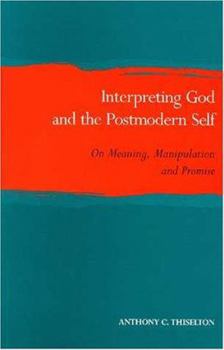Interpreting God and the Postmodern Self: On Meaning, Manipulation, and Promise
Professor Thiselton compares and assesses modern and postmodern interpretations of the self and society on their own terms and in relation to Christian theology. He explores especially claims that... This description may be from another edition of this product.
Format:Paperback
Language:English
ISBN:0802841287
ISBN13:9780802841285
Release Date:December 1995
Publisher:William B. Eerdmans Publishing Company
Length:192 Pages
Weight:0.55 lbs.
Dimensions:0.6" x 5.4" x 8.4"
Customer Reviews
1 rating
Insightful and challenging account of the postmodern self.
Published by Thriftbooks.com User , 26 years ago
I really like this book. It is very clear, though Thiseleton is constantly referencing philosophers from all throughout history. I am American enough to find myself pining for the bottom line, but I know reading references is good for me because I am getting a lesson in philosophy and history at the same time! The sheer volume of citations in these first two parts testifies to the experience and the patience of Thistleton as a philosopher. In the first part, he examines the Nietzscheian idea that truth is nothing other than a metaphor that we have forgotten is a metaphor and keep around only in so far as it serves an individual's will to power. He points out that the postmodern fear of manipulation can actually be healthy for the Christian Church, because it will help us to unite against the "Christian Leaders" who are, in fact, merely manipulating people. He also points out that the whole Nietzscheian slave morality thing really just doesn't apply to true Christianity. He gives examples from Bonhoffer and Luther, testifying to the fact that Christianity is not a system of beliefs that calls for its people to remain passive while the Truth is being slandered. And as for manipulation, the New Testament is clear about the fact that false apostles will try to distort the Truth to suit their agenda, but we are not to give them any credit (2 Corinthians and Galatians). In chapter 5 Thistleton has a lot to say about Wittgenstein and language that is incredibly important. One of the major conclusions of part one is that Truth is usually best interpreted relationally. This is the idea that leads us into part two. In part two, we get a lesson in hermeneutics. This section seems exceedingly long, but that is just because Thistleton is so patient to give credit to all the different thinkers who have contributed to the discussion and all that. What we end up with, however, is fairly simple. It is basically just the exact opposite of Derrida's deconstructionism. In chapter 10, Thiselton gives us 5 interesting theses. 1) We can always tell something about the author when we study a text. 2) The Scriptures speak to our true selves. 3) All texts speak to readers as thinking selves. 4) Different interpretations tell about differences in readers. And 5) The Bible was written to transform our lives, and if we are to understand what it says, we must keep that in mind. The third part is basically just a refutation of Cupitt's "Sea of Faith Network" stuff. It seems that Cupitt was some sort of religious atheist who got a good deal of press over in Great Britain. Based on what Thiselton had to say about the movement, I really don't even see why Cupitt's ideas were worth the time it took to refute, but I guess because Cupitt wrote more than a book a year for about ten years and had a large following, Thiselton was worried that his ideas may spread. Part 4 is more constructive, I think, but less





